Monthly Archives:July 2022
The Gift of Time
 Time is such an interesting phenomenon. Young kids, especially, often have a distorted view of time and can have no concept and/or easily lose track of it (both good things!). They generally know that a few minutes is shorter than a few hours or days, but that is about the extent of it.
Time is such an interesting phenomenon. Young kids, especially, often have a distorted view of time and can have no concept and/or easily lose track of it (both good things!). They generally know that a few minutes is shorter than a few hours or days, but that is about the extent of it.
You might be familiar with the saying, “the days are long, but the years are short”. I sometimes feel that way about camp; the days are long, but the summer is short! I have often said that a typical camp day is really 3 days. The morning is a day. The afternoon is another day. The evening is a third day. This explains why we are so tired at night. By the time we crawl under the covers, we have really been up for 3 days straight! It is also the reason we sleep so deeply and so well in our cozy cabins.
 There is no doubt that we are aware that the number of days at camp are dwindling. And quickly. We can’t help but feel it. The end of the summer always goes faster than the beginning. When the staff arrived and we had 10 days of pre-camp training this year, 7+ weeks of summer stretched out ahead of us. We had all the time in the world. In June there seemed to be an endless supply of the camp days we long for the rest of year. Or so we thought. The roughly 1.28 weeks remaining now seem like nothing. All of a sudden, the surplus of time we banked on earlier in the summer can be counted on two hands. Now we wonder where did the time go?!
There is no doubt that we are aware that the number of days at camp are dwindling. And quickly. We can’t help but feel it. The end of the summer always goes faster than the beginning. When the staff arrived and we had 10 days of pre-camp training this year, 7+ weeks of summer stretched out ahead of us. We had all the time in the world. In June there seemed to be an endless supply of the camp days we long for the rest of year. Or so we thought. The roughly 1.28 weeks remaining now seem like nothing. All of a sudden, the surplus of time we banked on earlier in the summer can be counted on two hands. Now we wonder where did the time go?!
 This realization makes us truly value the gift of time we have. While we can’t completely stop the clock from ticking, at the very least we can make it appear to slow down as we savor every moment from this point forward. To make the most of the remaining days that are left, it might be helpful to reflect on those things we need to do MORE and LESS of so that we are truly present and enjoying every single minute of this precious commodity called time.
This realization makes us truly value the gift of time we have. While we can’t completely stop the clock from ticking, at the very least we can make it appear to slow down as we savor every moment from this point forward. To make the most of the remaining days that are left, it might be helpful to reflect on those things we need to do MORE and LESS of so that we are truly present and enjoying every single minute of this precious commodity called time.
- Spending time with friends
- Singing
- Building pyramids
- Being in the moment
- Adding new twists to activities
- Being flexible (knowing that some things are out of our control)
- Recognizing the good things
- Being silly
- Wearing costumes just because
- Focusing on the positive
- Appreciating nature
- Getting rest
- Being grateful
- Assuming the best intentions of others
- Stressing over the little stuff (someone borrowing something without asking)
- Complaining (it’s so hot, the water is too cold)
- Comparing our achievements to others (better to compare to earlier versions of ourselves)
- Drama (unless it is your activity)
- Worrying about what’s next after camp (school, work)
- Eating Dan’s lasagne (well, maybe not…)
 I can assure you that since we know what we are up against with our fight against time, we are acutely aware of what needs to happen to make the “Cool to be You in ’22” one for the books! Bucket lists are being made. We don’t want there to be any regrets. Staff are pouring everything they have into making the final sign-up of activities one of progress and skill advancement. We are enjoying time as cabin groups and a camp community. We are throwing in a few surprises here and there to keep things exciting (spoon tag coming up – get ready!).
I can assure you that since we know what we are up against with our fight against time, we are acutely aware of what needs to happen to make the “Cool to be You in ’22” one for the books! Bucket lists are being made. We don’t want there to be any regrets. Staff are pouring everything they have into making the final sign-up of activities one of progress and skill advancement. We are enjoying time as cabin groups and a camp community. We are throwing in a few surprises here and there to keep things exciting (spoon tag coming up – get ready!).
This week was the much anticipated all-camp Olympics. There was an ENORMOUS amount of cheering across the swim area, field and Woodland Road as campers supported their own and the opposing team (Good Job Everybody, Good Job!). The counselors were SO into it – face paint, costumes, energy, and spirit – nothing short of the best kind of pure camp fun.
 Regardless of whether we are at camp or at home or school, time is a gift. A gift without a price tag. Time has a way of showing us what really matters. At Camp Woodland, the people are what matter most. Yes, it may feel like “crunch” time and the days are getting to be less and less, but there is still MORE summer to do!! A LOT more.
Regardless of whether we are at camp or at home or school, time is a gift. A gift without a price tag. Time has a way of showing us what really matters. At Camp Woodland, the people are what matter most. Yes, it may feel like “crunch” time and the days are getting to be less and less, but there is still MORE summer to do!! A LOT more.
p.s. What can YOU do more/less of in the days before your camper/s return home?
Anything But Ordinary
 When you hear the morning bell at Woodland, you can picture parts of your day right away. You know what activities you’re going to take, you know at what times you’ll eat, and you’ll pull yourself awake knowing that rest hour is coming in the middle part of the day. You’ll probably have a suspicion that you’ll laugh a lot during the day, that someone will do something kind for you, that you’ll go to sleep at night with a different camp song stuck in your head.
When you hear the morning bell at Woodland, you can picture parts of your day right away. You know what activities you’re going to take, you know at what times you’ll eat, and you’ll pull yourself awake knowing that rest hour is coming in the middle part of the day. You’ll probably have a suspicion that you’ll laugh a lot during the day, that someone will do something kind for you, that you’ll go to sleep at night with a different camp song stuck in your head.
But for all that you do know as you start thinking about today, there’s also a rush of excitement realizing there’s so much you do not know about the day, and it’s rife with possibility. There is a novelty and liveliness about each day that makes getting up that much easier, as you anticipate all of the paths the day might take.
 You go to your first activity and stretch on the gymnastics mats. Today is one of the final rehearsals for tomorrow’s end-of-session shows, and you find that you are excited and nervous at the same time. As you take off your shoes and socks, you notice the pile of multi-colored Crocs. You realize that certain camp traditions (like wearing Crocs) is something that connects you to the other campers. You love collecting and trading Jibbitz (shoe decorations) with your friends.
You go to your first activity and stretch on the gymnastics mats. Today is one of the final rehearsals for tomorrow’s end-of-session shows, and you find that you are excited and nervous at the same time. As you take off your shoes and socks, you notice the pile of multi-colored Crocs. You realize that certain camp traditions (like wearing Crocs) is something that connects you to the other campers. You love collecting and trading Jibbitz (shoe decorations) with your friends.
You step back and think about how friendships are born here–some of the best friends of your life may not have been made because they were your bunkmate, but just as a happy accident of being in the same activity or sitting next to each other at movie night. Making friends is easier here, maybe because you’re away from your phone and you’re engaged in more conversations, maybe because people are just a little gentler here, softer, wanting to be your friend, too, and maybe this will help you realize that you can make friends easier away from camp as well.
As you transition to another activity and see some of your cabin mates on the path down to the beach, the news hits your ears that your cabin got a “30” on inspection. Yes! Everyone is working together to do cabin chores after breakfast in the hopes of winning the coveted “Clean Freaks” award for the week. This could mean a pizza party, trip to Cathy’s or a special night of tubing on Sand Lake!
 You go to lunch and after, your counselors bring back the mail. You hop on your bunk and spend several minutes basking in the delight of hearing news from home. You know you are missed and yet your family and friends are always eager to hear the latest update from camp. You quickly grab a piece of paper or BunkNote to write a response to the questions of how things are going. How do you accurately describe the fun you had on your cabin’s overnight across the lake, the excitement of finally getting a bull’s eye at the archery range, the feeling of accomplishment when you cantered for the first time, the pure joy of hanging out with your friends during Rec Swim or how you laughed so hard at lunch that water came out of your nose?! You wonder if the people on the other end of your letter will think it is weird that you now LOVE eating American cheese and carrots sticks as a new snack combo thanks to Counselor Jackie!
You go to lunch and after, your counselors bring back the mail. You hop on your bunk and spend several minutes basking in the delight of hearing news from home. You know you are missed and yet your family and friends are always eager to hear the latest update from camp. You quickly grab a piece of paper or BunkNote to write a response to the questions of how things are going. How do you accurately describe the fun you had on your cabin’s overnight across the lake, the excitement of finally getting a bull’s eye at the archery range, the feeling of accomplishment when you cantered for the first time, the pure joy of hanging out with your friends during Rec Swim or how you laughed so hard at lunch that water came out of your nose?! You wonder if the people on the other end of your letter will think it is weird that you now LOVE eating American cheese and carrots sticks as a new snack combo thanks to Counselor Jackie!
 The bell rings again to send you off to your afternoon activities; today the periods are shortened so that everyone can get ready for Woodland’s annual birthday celebration. As dinner approaches, you are enthralled by the rush of energy that the assembly area is filled with tonight. Cabins and friends are eager to record this moment with as many photos as possible so that the memories are at the ready to pull out at any given moment in the upcoming year.
The bell rings again to send you off to your afternoon activities; today the periods are shortened so that everyone can get ready for Woodland’s annual birthday celebration. As dinner approaches, you are enthralled by the rush of energy that the assembly area is filled with tonight. Cabins and friends are eager to record this moment with as many photos as possible so that the memories are at the ready to pull out at any given moment in the upcoming year.
 You are delighted when you see all of the decorations and the beautiful cake the kitchen staff prepared specially for tonight’s party as you enter the lodge. You enjoy chicken patties and tater tots followed by cake and ice cream and the recognition of each person’s time at Woodland. There is applause and cheers as campers and staff stand for their 1st year, 4th year or 7th year. You wait on the edge of your seat as those who are marking 5 or 10 years are waiting their turn to receive a much anticipated Woodland pendant or blanket. A poem is read that speaks to the journey each person has taken and the growth that has occurred during their time at camp. You marvel that there are staff who have been at camp for 20+ years and think how fortunate they must be to have a way that brings them back to camp year after year.
You are delighted when you see all of the decorations and the beautiful cake the kitchen staff prepared specially for tonight’s party as you enter the lodge. You enjoy chicken patties and tater tots followed by cake and ice cream and the recognition of each person’s time at Woodland. There is applause and cheers as campers and staff stand for their 1st year, 4th year or 7th year. You wait on the edge of your seat as those who are marking 5 or 10 years are waiting their turn to receive a much anticipated Woodland pendant or blanket. A poem is read that speaks to the journey each person has taken and the growth that has occurred during their time at camp. You marvel that there are staff who have been at camp for 20+ years and think how fortunate they must be to have a way that brings them back to camp year after year.
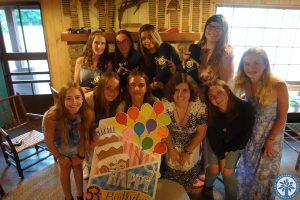 The day ends with birthday games and you watching the splendor of a dramatic sunset lighting up the sky, surrounded by the deep blues of clouds, the orange and pink shining above the tallest of pine trees. And you think about how well-lived this day was, and know that none of your others will be just like it. Maybe it was a normal day at camp for you–a routine you anticipated, a predictable structure. And yet when you look back on it, it was special. Today brought you closer to friends, it made you feel more connected to the Woodland community, there were delights you never could have anticipated and wouldn’t trade for anything. Because at Woodland, you realize, there simply aren’t ordinary days.
The day ends with birthday games and you watching the splendor of a dramatic sunset lighting up the sky, surrounded by the deep blues of clouds, the orange and pink shining above the tallest of pine trees. And you think about how well-lived this day was, and know that none of your others will be just like it. Maybe it was a normal day at camp for you–a routine you anticipated, a predictable structure. And yet when you look back on it, it was special. Today brought you closer to friends, it made you feel more connected to the Woodland community, there were delights you never could have anticipated and wouldn’t trade for anything. Because at Woodland, you realize, there simply aren’t ordinary days.
adapted from RBC blog, July 2022
Developing Courage
 We often hear campers say, “I’m always more confident and brave when I get back from camp.” Awesome! And, “at camp, I figure out how to be my best self, even though that’s hard at home.” Wow! Doubly awesome!
We often hear campers say, “I’m always more confident and brave when I get back from camp.” Awesome! And, “at camp, I figure out how to be my best self, even though that’s hard at home.” Wow! Doubly awesome!
How does camp inspire children to develop courage?
Life at summer camp, especially at a place like Woodland, provides unique experiences that show kids how to approach things more courageously. It gives them daily opportunities to act bravely and to develop the confidence to be courageous in the future.
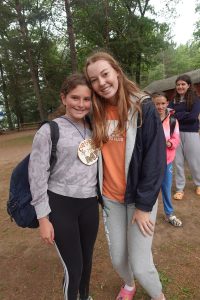 Most explicitly, we are encouraging our kids to be brave simply by sending them to camp. We’re placing them in a new environment where they are, on their own, doing new things. It takes courage for a child to leave the safety and familiarity of home, mom’s food, comfortable private spaces, and the security of their personal devices. Camp is so utterly different from life at home, it’s by definition challenging and can easily be uncertain and scary. There are bound to be social challenges at camp too, unfamiliar people to encounter and learn to be friends with. But at camp, all of this is completely normal, expected and encouraged. It’s supposed to be different from home in these ways; and that’s what makes it great!
Most explicitly, we are encouraging our kids to be brave simply by sending them to camp. We’re placing them in a new environment where they are, on their own, doing new things. It takes courage for a child to leave the safety and familiarity of home, mom’s food, comfortable private spaces, and the security of their personal devices. Camp is so utterly different from life at home, it’s by definition challenging and can easily be uncertain and scary. There are bound to be social challenges at camp too, unfamiliar people to encounter and learn to be friends with. But at camp, all of this is completely normal, expected and encouraged. It’s supposed to be different from home in these ways; and that’s what makes it great!
Simply being here proves to girls, they can do it. Even when they are feeling scared, they can overcome challenges on their own. They can makes friends even when they don’t know anyone. They can try jambalaya (it might be good!). They can entertain themselves by being creative even without their smartphones. They can share cabin space with other people, help clean up common spaces, and be interested in how other people are doing. They can sign up for tennis class even if they’re a little afraid they’re “no good at sports.” They can let themselves be silly performing a skit in front of the entire camp. Kids are courageous by simply being at camp. They prove their bravery by living their camp life.
 This is also true with respect to many of the activities at camp. They take courage just to give them a try! Take horseback riding. Not only is it physically demanding to pull yourself up on a horse, it can be scary to put trust in a very large animal. You have to be brave to overpower your fears with concentration and determination. We can point to sailing in a similar way. It takes nerve to go out on a boat on a windy day and just use your skills to navigate whatever Mother Nature brings your way. The risk of capsizing is there, but here too, camp girls are facing it bravely. Every activity requires courage since the outcome always includes some degree of uncertainty. Through these activities girls learn to tap into their courageous spirit when needed.
This is also true with respect to many of the activities at camp. They take courage just to give them a try! Take horseback riding. Not only is it physically demanding to pull yourself up on a horse, it can be scary to put trust in a very large animal. You have to be brave to overpower your fears with concentration and determination. We can point to sailing in a similar way. It takes nerve to go out on a boat on a windy day and just use your skills to navigate whatever Mother Nature brings your way. The risk of capsizing is there, but here too, camp girls are facing it bravely. Every activity requires courage since the outcome always includes some degree of uncertainty. Through these activities girls learn to tap into their courageous spirit when needed.
 The art activities at camp teach another important lesson about courage. The girls learn that being “perfect” is not the goal, that “messing up” is OK because what’s most important is the process of doing. Art at camp is done for “the fun of it,” for the joy of creative expression, and for the guaranteed novelty of the experience. There’s really no way to “fail,” so camp art projects do wonders to lessen any “fear of failure” a child might harbor. It still takes courage to pick up a paint brush, since again, there’s no telling how your efforts to paint will turn out. But making that decision to try is the most important step.
The art activities at camp teach another important lesson about courage. The girls learn that being “perfect” is not the goal, that “messing up” is OK because what’s most important is the process of doing. Art at camp is done for “the fun of it,” for the joy of creative expression, and for the guaranteed novelty of the experience. There’s really no way to “fail,” so camp art projects do wonders to lessen any “fear of failure” a child might harbor. It still takes courage to pick up a paint brush, since again, there’s no telling how your efforts to paint will turn out. But making that decision to try is the most important step.
It’s also important that camp is a place where children make their own decisions. Throughout their day, they are faced with choices, and after considering what different options entail, live with the consequences of what they decide. This agency is truly empowering and a great source of self confidence. Making decisions independently, and having them turn out fine, gives kids real life evidence that even in times of uncertainty, they can be brave and make a choice. They can lean in rather than shy away. Choosing what activities to take, weighing how to spend their free time, deciding to stand up for themselves in a difficult social encounter, making the leap to help someone, consciously just taking care of things— these are all camp experiences where girls show their bravery and prove they’re powerful.
 In all these ways, kids are brave at camp. Different perhaps from at home, here they find themselves in situations that require courage and still, they act. They face their fears and tackle adventure. They learn that it’s OK to make mistakes and try again. They make countless decisions for themselves moving through a complex social landscape.
In all these ways, kids are brave at camp. Different perhaps from at home, here they find themselves in situations that require courage and still, they act. They face their fears and tackle adventure. They learn that it’s OK to make mistakes and try again. They make countless decisions for themselves moving through a complex social landscape.
So what is it about camp that helps kids do all this? Yes, they’re acting bravely while here, but what’s special about camp life that gives them this nerve?
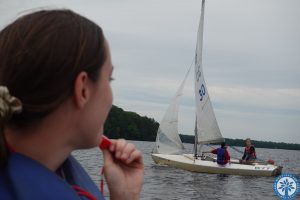 Here again, we can point to the camp community and its values as the source of this power to inspire bravery. It starts with a very explicit ethic to be kind, to be friendly, supportive and accepting. Woodland is also a place with minimal competition, and instead champions enthusiastic cooperation, genuine communication and joyful participation. Essentially, the camp community stands behind everyone here making the consequences of being brave (of doing uncertain things) less worrisome. There’s less to be afraid of when we’re not competing, when creativity is valued over perfection, and when we have friends by our side. Kids are brave at camp because we’re all being brave together, proving to each other that everything’s fine.
Here again, we can point to the camp community and its values as the source of this power to inspire bravery. It starts with a very explicit ethic to be kind, to be friendly, supportive and accepting. Woodland is also a place with minimal competition, and instead champions enthusiastic cooperation, genuine communication and joyful participation. Essentially, the camp community stands behind everyone here making the consequences of being brave (of doing uncertain things) less worrisome. There’s less to be afraid of when we’re not competing, when creativity is valued over perfection, and when we have friends by our side. Kids are brave at camp because we’re all being brave together, proving to each other that everything’s fine.
 But when this kind of community support is missing, as it tends to be outside of camp, it’s of course more difficult to be brave. There’s simply more trepidation in the real world of competition and pressures to perform. Our hope though is that, like the campers who tell us they are more courageous right after camp, all of your girls too will have strengthened their nerve while they’re at Woodland. We hope they’ll remember all the new things they’ve accomplished, all the challenges they’ve overcome, and all the decisions they’ve made successfully— all on their own, independently from their parents. Seeing your girls be this brave at camp, you’d be very proud. Seeing their courage at home, even more so.
But when this kind of community support is missing, as it tends to be outside of camp, it’s of course more difficult to be brave. There’s simply more trepidation in the real world of competition and pressures to perform. Our hope though is that, like the campers who tell us they are more courageous right after camp, all of your girls too will have strengthened their nerve while they’re at Woodland. We hope they’ll remember all the new things they’ve accomplished, all the challenges they’ve overcome, and all the decisions they’ve made successfully— all on their own, independently from their parents. Seeing your girls be this brave at camp, you’d be very proud. Seeing their courage at home, even more so.
Adapted from RBC blog, July 2022.
A Parent’s Perspective on Building Strong Girls to be Strong Women and Leaders
 How do you Build Strong Girls to be Strong Women and Leaders?This one is tricky. For every mother or father you ask, you could get a different answer to this question. For starters, if you are reading this, chances are, you are sending your daughter/s to a 6 week-long summer camp. I don’t know about you, but that certainly isn’t the norm where we live. We are already, simply by making the decision to send our kids to camp, challenging the current cultural norms. Showing them without saying it outright, “It doesn’t matter what everyone else does. This is what we believe is best for you.”
How do you Build Strong Girls to be Strong Women and Leaders?This one is tricky. For every mother or father you ask, you could get a different answer to this question. For starters, if you are reading this, chances are, you are sending your daughter/s to a 6 week-long summer camp. I don’t know about you, but that certainly isn’t the norm where we live. We are already, simply by making the decision to send our kids to camp, challenging the current cultural norms. Showing them without saying it outright, “It doesn’t matter what everyone else does. This is what we believe is best for you.”
 I truly believe this is an investment to build independence, for their growth, for unique challenges, for successes, for failures, and for learning from those failures. The failures might be in a physical activity. They might be with friendships. They might be in learning or not learning new social skills. Regardless of the type of failure, fail they do. For the most part, this is without our knowing and without our help. We support all of these experiences when we agree to send them away to camp. We agree to take ourselves out of the equation for 6 weeks. And while in our heads we know this to be critically beneficial for them, it can still be difficult. Hopefully, we can agree on, just because something is difficult, doesn’t mean we shouldn’t do it. We know the overnight camp experience builds stamina and inner strength for our girls.
I truly believe this is an investment to build independence, for their growth, for unique challenges, for successes, for failures, and for learning from those failures. The failures might be in a physical activity. They might be with friendships. They might be in learning or not learning new social skills. Regardless of the type of failure, fail they do. For the most part, this is without our knowing and without our help. We support all of these experiences when we agree to send them away to camp. We agree to take ourselves out of the equation for 6 weeks. And while in our heads we know this to be critically beneficial for them, it can still be difficult. Hopefully, we can agree on, just because something is difficult, doesn’t mean we shouldn’t do it. We know the overnight camp experience builds stamina and inner strength for our girls.
Our daughters are living 6 weeks of their lives without us. At fist we wonder how they will survive without all the wisdom we have to impart (especially funny if you have teenage daughters!). They won’t have the same safe (sometimes overprotective) boundaries we provide at home. Our daughters may have been nervous themselves before this summer started. Even those who have been to camp for multiple years can be apprehensive about what the upcoming summer is going to bring because each year is different. And we can’t make it all better for them.
 Not by telling them they don’t have to go to camp. Not by telling them it’s all going to be okay. Not by helping them while they are at camp. Not by being there when they struggle. It’s out of our hands, and that can be scary. Our primary role is to listen when they get home from camp. Listen with compassion, love, and awe as they may share some of their struggles and how they made it through them. We can also remind them of what they shared with us when challenges arise throughout the school year. They carry these failures, successes, and seeds for strength with them wherever they go.
Not by telling them they don’t have to go to camp. Not by telling them it’s all going to be okay. Not by helping them while they are at camp. Not by being there when they struggle. It’s out of our hands, and that can be scary. Our primary role is to listen when they get home from camp. Listen with compassion, love, and awe as they may share some of their struggles and how they made it through them. We can also remind them of what they shared with us when challenges arise throughout the school year. They carry these failures, successes, and seeds for strength with them wherever they go.
 By allowing our daughters to be without us, we are supporting the development of their internal resources separate from parents and family. They learn how remarkably capable and adaptable they are from a great group of “near peer” role models (the counselors). They experience and learn firsthand, rather than being told by a parent or coach, what their strengths, weaknesses, and areas of interest are. This at any age is a priceless gift. In this era, it doesn’t seem to happen as naturally anywhere else other than at overnight camp.
By allowing our daughters to be without us, we are supporting the development of their internal resources separate from parents and family. They learn how remarkably capable and adaptable they are from a great group of “near peer” role models (the counselors). They experience and learn firsthand, rather than being told by a parent or coach, what their strengths, weaknesses, and areas of interest are. This at any age is a priceless gift. In this era, it doesn’t seem to happen as naturally anywhere else other than at overnight camp.
This is not to say that families aren’t critically important to children’s growth and development. Of course they are. We are. But by taking ourselves out of the equation for 6 weeks -not 1 or 2, but 6-, says without saying that we believe they will be okay without us. And for most of us, if not all, we see after the 6 weeks, that not only were they okay, but they thrived. They grew, developed, and matured. We know that not all of this growth would not have occurred had they stayed home. We ultimately want our daughters to one day be independent, confident, and strong on their own. We are fortunate to have Woodland as part of the equation to help get them there.
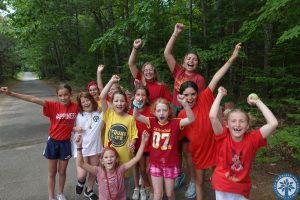 This means that we place our trust in camp – the counselors, staff, the woods, the lake, the fields, the friends, the inevitable conflicts – to keep our children thriving and learning with the physical and emotional safety nets camp provides. All the staff are modeling being a female in leadership. The counselors are all women. The directors of the activities are all women. Our youngest campers at age 7 see all the ways in which women lead with skill, compassion, and laughter. They learn firsthand how to be a leader in a way that promotes the thriving of those that follow or are learning from them. The Woodland leadership is committed to the growth of the campers, not to promote themselves. A message and living example that is sorely needed right now.
This means that we place our trust in camp – the counselors, staff, the woods, the lake, the fields, the friends, the inevitable conflicts – to keep our children thriving and learning with the physical and emotional safety nets camp provides. All the staff are modeling being a female in leadership. The counselors are all women. The directors of the activities are all women. Our youngest campers at age 7 see all the ways in which women lead with skill, compassion, and laughter. They learn firsthand how to be a leader in a way that promotes the thriving of those that follow or are learning from them. The Woodland leadership is committed to the growth of the campers, not to promote themselves. A message and living example that is sorely needed right now.
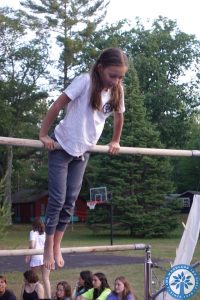 You may believe your daughter isn’t a leader. And, not everyone can or will be a leader in the limelight. But even attending camp for one summer will allow her to try on that role. Everyone gets the chance to lead in one way or another. And even those who are frightened or not comfortable being a leader, will get the opportunity to try. Leaders come in every shape and size and skill. At camp there are chances to lead in each way every day. How awesome it is to be able to give the gift of inner strength and leadership to our girls this summer!
You may believe your daughter isn’t a leader. And, not everyone can or will be a leader in the limelight. But even attending camp for one summer will allow her to try on that role. Everyone gets the chance to lead in one way or another. And even those who are frightened or not comfortable being a leader, will get the opportunity to try. Leaders come in every shape and size and skill. At camp there are chances to lead in each way every day. How awesome it is to be able to give the gift of inner strength and leadership to our girls this summer!
This blog was written by a current camp parent and Woodland alum. Susan Austin Short began her time at camp when she was 8 years old. She was a camper for 7 years and on staff for several years after that (she has her 10 year blanket!). Susan and I were co-counselors together in Tamarack during my first summer. We shared an apartment in Chicago when we were both pursuing Master’s Degrees in the early 90’s. Now we share stories of how camp builds strong girls that will one day be strong women and leaders.
Life Lessons, Tutus, and Harry Potter
 An article about summer camp has been floating around social media the past few days from the Wall Street Journal. It’s an interesting memoir of sorts by Rich Cohen who spent his camp years at our Sand Lake neighbor, Camp Menominee. It is entitled, “The Life Lessons of Summer Camp: The Enduring Frontier.” The article is behind a paywall requiring a subscription to read it, but a couple of the points it makes are worth highlighting, mostly because they apply to Woodland as well. It is obvious the fondness the author has for his years at camp, and the long lasting impact those years have had on him as an adult. He claims, “Everything important I know, I learned at camp.”
An article about summer camp has been floating around social media the past few days from the Wall Street Journal. It’s an interesting memoir of sorts by Rich Cohen who spent his camp years at our Sand Lake neighbor, Camp Menominee. It is entitled, “The Life Lessons of Summer Camp: The Enduring Frontier.” The article is behind a paywall requiring a subscription to read it, but a couple of the points it makes are worth highlighting, mostly because they apply to Woodland as well. It is obvious the fondness the author has for his years at camp, and the long lasting impact those years have had on him as an adult. He claims, “Everything important I know, I learned at camp.”
He’s not talking about the things he learned in his activities, like how to shoot archery or make a mooring on a sailboat. He means more important things like being a stronger person, being independent enough to solve his own problems, and confident enough to “face new situations, read hierarchies, make my way among strangers, [and be] able to adapt.”
 I’d say similar things for the girls at Camp Woodland. As an adult, they might not remember how (or be able) to canter or do a back handspring, but what’s important is their learning to be a good friend through kindness, to be more independent and confident when facing new things, and to be more comfortable being who they really are. There are many of these deeper lessons learned at camp.
I’d say similar things for the girls at Camp Woodland. As an adult, they might not remember how (or be able) to canter or do a back handspring, but what’s important is their learning to be a good friend through kindness, to be more independent and confident when facing new things, and to be more comfortable being who they really are. There are many of these deeper lessons learned at camp.
Cohen’s article also summarizes the history of summer camps in America from its earliest example, the camp established in 1861 by Frederick Gunn, through the many camps established in the early 1900s (with many being referenced from Wisconsin) devoted to “character building” and time outdoors closer to nature. Camps have of course changed over the years— shorter sessions, better food, and way more photos being taken —but the core experience of camp remains the same.
“[Camp is] still not home. It’s still no parents. It’s still new people. It’s still the woods. It’s still the world. It’s still 15 (6-12) bodies in a bunk, stiff beds (mattresses are replaced when needed), wool blankets (for chilly nights in the Northwoods), no TV (100%), rank odor (our cabins are cleaned daily), fungus (that’s what weekly health checks are for), bugs (most definitely), pranks (not at Woodland), bed-wetters (counselors discreetly handle this when it happens), summer friends, dark nights and star-filled skies. It’s still your best chance of getting them away from the phones and screens. It’s still paradisiacal and green. And it’s still what we need— now more than ever.”
 This past weekend marked the end of the first two weeks (sigh). It was fun to see the campers taking drama, dance and gymnastics perform their routines for the entire camp. As a Mom mentioned on last year’s parent survey (BTW we LOVE feedback and DO read each and every comment!),
This past weekend marked the end of the first two weeks (sigh). It was fun to see the campers taking drama, dance and gymnastics perform their routines for the entire camp. As a Mom mentioned on last year’s parent survey (BTW we LOVE feedback and DO read each and every comment!),
“It seems like we take her to an activity once a week at home, and she stays at the same level for months and months until she gets sick of it and wants to quit. At camp, she was able to practice every day and achieve her goals for the summer. This really gave her so much confidence. Also the level of support from the other campers is amazing. I watched everyone encouraging each other and lifting each other up and don’t think that she has been in such a positive environment before!”
 Campers DO get to do activities daily, which is the equivalent of about 10 hours spent every 2 weeks learning and practicing new skills. And, we are a very supportive community. The cheers and applause before, during, and after these end-of-session performances are genuine and heartfelt. Even if gymnastics, dance, and drama aren’t your thing, it is super cool to be able to watch and give words of encouragement while your cabinmate/s do a routine on the beam, wear a tutu as part of the costume for a catchy number, and/or to have a part in Robin Hood.
Campers DO get to do activities daily, which is the equivalent of about 10 hours spent every 2 weeks learning and practicing new skills. And, we are a very supportive community. The cheers and applause before, during, and after these end-of-session performances are genuine and heartfelt. Even if gymnastics, dance, and drama aren’t your thing, it is super cool to be able to watch and give words of encouragement while your cabinmate/s do a routine on the beam, wear a tutu as part of the costume for a catchy number, and/or to have a part in Robin Hood.
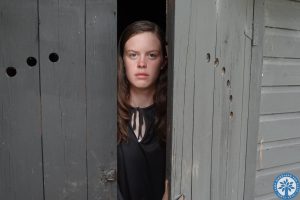 It is also fun to put aside instructional activities for a day and to do something totally different on Sundays. Sleeping in an extra 30 minutes, wearing jammies to breakfast then donning Woodland wear to show camp spirit, reflecting on a theme for Inspiration Hour, having chicken for lunch (and ice cream sundaes for dessert!), and then getting to participate in a special event planned by the oldest campers, the CIT’s (counselors-in-training). This Sunday’s theme was Harry Potter. No imagination or stretch necessary to see that everything important IS learned at summer camp!
It is also fun to put aside instructional activities for a day and to do something totally different on Sundays. Sleeping in an extra 30 minutes, wearing jammies to breakfast then donning Woodland wear to show camp spirit, reflecting on a theme for Inspiration Hour, having chicken for lunch (and ice cream sundaes for dessert!), and then getting to participate in a special event planned by the oldest campers, the CIT’s (counselors-in-training). This Sunday’s theme was Harry Potter. No imagination or stretch necessary to see that everything important IS learned at summer camp!



